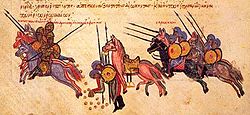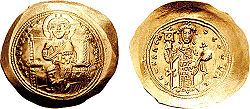- Doukas
-
For the 15th-century historian, see Doukas (historian).For the Composer, see Dukas.
Doukas, latinized as Ducas (Greek: Δούκας; fem. Doukaina/Ducaena, Δούκαινα; pl. Doukai/Ducae, Δούκαι), from the Latin tile dux ("leader, general", hellenized as doux), is the name of a Byzantine Greek noble family, whose branches provided several notable generals and rulers to the Byzantine Empire. The continuity of descent amongst the various branches is not clear though, and historians generally recognize several distinct groups of Doukai based on their occurrence in the contemporary sources. In the words of D.I. Polemis, who compiled the only overview work on the bearers of the Doukas name, in view of this lack of genealogical continuity "it would be a mistake to view the groups of people designated by the cognomen of Doukas as forming one large family".[1]
Contents
History
Origins
Nothing is known for certain about the family's origin. Later tradition, mentioned by the historian Nikephoros Bryennios, held that they descended from a cousin of the Roman Emperor Constantine I who had migrated to Constantinople in the 4th century and allegedly became the city's governor with the title of doux. This tradition is however evidently an invention meant to glorify the family, at the time the Empire's ruling dynasty, by 11th-century court chroniclers.[2][3] In fact, it is more likely that the surname derives from the relatively common military rank of doux.[4] Nothing is known about the family's origin. Several authors have raised the possibility of an Armenian descent, but it is almost certain that the Doukai were in fact Greek-speakers, probably from Paphlagonia, where their estates were located.[3][5]
The Doukai of the early 10th century
 Constantine Doukas escapes from Arab captivity, throwing gold coins behind him to delay his pursuers. Miniature from the Madrid Skylitzes chronicle
Constantine Doukas escapes from Arab captivity, throwing gold coins behind him to delay his pursuers. Miniature from the Madrid Skylitzes chronicle
The first representative of the family appears in the mid-9th century, during the regency of Empress Theodora (r. 842–855), when he was sent to forcibly convert the Paulicians to Orthodoxy. He is only known as "the son of Doux", although Skylitzes interpolates the name of Andronikos, probably in confusion with Andronikos Doukas (see next). This name is also used by some modern sources, e.g. in the Prosopographie der mittelbyzantinischen Zeit (Andronikos #433).[6][7]
The first branch of the family to achieve prominence was in the early 10th century (they are usually referred to with the archaic form Doux rather than Doukas in the sources), with Andronikos Doukas and his son Constantine Doukas. Both were senior generals during the reign of Emperor Leo VI the Wise (r. 886–912). In ca. 904, Andronikos engaged in unsuccessful rebellion, and was force to flee to Baghdad, where he was killed in ca. 910. Constantine managed to escape and was restored to high office, becoming Domestic of the Schools. He was killed however, along with his son Gregory and nephew Michael, in an unsuccessful coup in June 913.[8][9][10] These deaths, along with the castration and exile of Constantine's younger son Stephen and the death of a Nicholas Doukas (of uncertain relation to the others) at the battle of Katasyrtai in 917, mark the end of the first group of Doukai recorded in the Byzantine sources. It is likely, as the 12th-century historian Zonaras records, that the Doukai line died out, and that the later bearers of the name were descendants through the female line only.[6][8][11]
The Lydoi-Doukai under Basil II
Towards the end of the 10th century there appeared a second family, sometimes known as Lydoi ("the Lydians", likely indicating their origin). Its members were Andronikos Doux Lydos and his sons, Christophoros and Bardas, the latter known with the sobriquet Mongos ("hoarse"). It is unclear whether the doux in Andronikos' name is a surname or a military rank; some scholars consider them as belonging to the Doukas clan, although the exact relation, if any, with the earlier Doukai, is impossible to ascertain. The family was involved in the 976–979 rebellion of Bardas Skleros against Emperor Basil II (r. 976–1025), but the sons were later pardoned and resumed their careers. Bardas the Mongos is attested as late as 1017, when he led a military expedition against the Khazars.[6][12][13]
The Doukas imperial dynasty
 Gold histamenon of Constantine X Doukas
Gold histamenon of Constantine X Doukas
The third group of the family, the Doukai of the 11th century, was the more numerous and distinguished one, providing several generals, governors and founding the Doukid dynasty which ruled Byzantium from 1059 to 1081. These Doukai seem to have come from Paphlagonia, and were exceedingly wealthy, possessing extensive estates in Anatolia. Again, the relationship of this group with the Doukai of the 9th and 10th centuries is unclear; the contemporary writers Michael Psellos and Nicholas Kallikles affirm such a relationship, but Zonaras openly questioned it.[6][14][15]
The most famous members of this group were the dynasty's founder, Emperor Constantine X Doukas (r. 1059–1067), his brother John Doukas, katepano and later Caesar, Constantine's son Michael VII Doukas (r. 1071–1078), Michael's younger brothers, Konstantios and Andronikos Doukas, Michael's son and co-emperor Constantine Doukas and John's son, the general Andronikos Doukas.[6][14]
During this period, the family intermarried with other aristocratic clans: before becoming emperor, Constantine X had married into the powerful Dalassenoi family, and took as a second wife Eudokia Makrembolitissa, niece of the Patriarch Michael Keroularios. Further dynastic matches were made with the clans of the Anatolian military aristocracy, including the Palaiologoi and the Pegonitai.[16] The most important connection however was to the Komnenoi: in 1077, Alexios Komnenos, then a general and later emperor (r. 1081–1118), married Irene Doukaina, the great-niece of Constantine X; thereafter, the family name Komnenodoukas was often used.[6] This marriage alliance crucial for Alexios' own rise to the purple: his marriage to a Doukaina made him senior to his elder brother Isaac, and it was Doukai financial and political support that largely facilitated the successful and bloodless coup that brought him to the throne.[17]
Under the Komnenoi
Their association with the Komnenoi helped ensure the continued prominence and prestige of the Doukas name at the apex of the Byzantine aristocracy into the Komnenian period, and the presence of the family's members amongst the higher officials of the Byzantine state.[18] During the reign of Alexios I, the Doukai continued to play an important role: Constantine Doukas was recognized as heir-apparent and affianced to Anna Komnene (although he lost his title when the future John II Komnenos was born); and Irene Doukaina's brothers, the protostrator Michael Doukas and the megas doux John Doukas were among the most prominent military leaders of the late 11th century.[19]
During the 12th century, the prestige of the Doukas name meant that it was often taken as a second surname by members of other families, even if remotely (and usually matrilineally) linked to the actual Doukai, who become relatively obscure after the turn of the century. It is hence impossible to clearly distinguish the numerous holders of the name or to discern their exact relationship with the 11th-century Doukid dynasty. The actual bloodline of Constantine X died out probably before 1100, and the last known descendants of his brother, the Caesar John, lived in the first half of the 12th century. The majority of the 12th-century bearers of the name were therefore most likely members of other families, linked through marriage with the Doukai, who chose to emphasize this relationship due to the prestige the name conferred.[6][20][21]
In this way, mingled with other lineages, the Doukas name survived into the last centuries of the Empire, such as the Komnenoi-Doukai of Epirus and Thessalonica, founded by the descendants of John Doukas, a grandson of Alexios I Komnenos and Irene Doukaina. Other examples include John III Doukas Vatatzes, Nicaean emperor (r. 1221–1254), and the late Byzantine historian Doukas.
References
- ^ Polemis (1968), pp. 1–2
- ^ Polemis (1968), p. 3
- ^ a b Krsmanovic (2003), Chapter 2
- ^ Polemis (1968), p. 4
- ^ Polemis (1968), pp. 5–6
- ^ a b c d e f g Kazhdan (1991), p. 655
- ^ Polemis (1968), pp. 2, 16
- ^ a b Krsmanovic (2003), Chapter 3
- ^ Polemis (1968), pp. 2, 6–7, 16–25
- ^ Kazhdan (1991), pp. 655, 657
- ^ Polemis (1968), pp. 2, 6–8, 25–26
- ^ Polemis (1968), pp. 2, 8, 26–27
- ^ Krsmanovic (2003), Chapter 4
- ^ a b Krsmanovic (2003), Chapter 5.1
- ^ Polemis (1968), pp. 8–11
- ^ Krsmanovic (2003), Chapter 5.2
- ^ Krsmanovic (2003), Chapter 5.4
- ^ Polemis (1968), p. 10
- ^ Kazhdan (1991), pp. 655, 657–658
- ^ Polemis (1968), pp. 10–11
- ^ Krsmanovic (2003), Chapter 6
Sources
- Cheynet, Jean-Claude (1996) (in French), Pouvoir et contestations à Byzance (963–1210), Publications de la Sorbonne, ISBN 978-2-85944-168-5, http://books.google.com/books?id=vicqWvzRLkYC
- Kazhdan, Alexander, ed. (1991), Oxford Dictionary of Byzantium, Oxford University Press, ISBN 978-0-19-504652-6
- Krsmanovic, Bojana (2003). "Doukas family". Encyclopedia of the Hellenic World - Asia Minor. http://www.ehw.gr/l.aspx?id=7855. Retrieved 25 August 2009.
- Polemis, Demetrios I. (1968), The Doukai: A Contribution to Byzantine Prosopography, London: Athlone Press
Categories:- Doukas family
- Byzantine Latin loanwords in Greek
Wikimedia Foundation. 2010.
